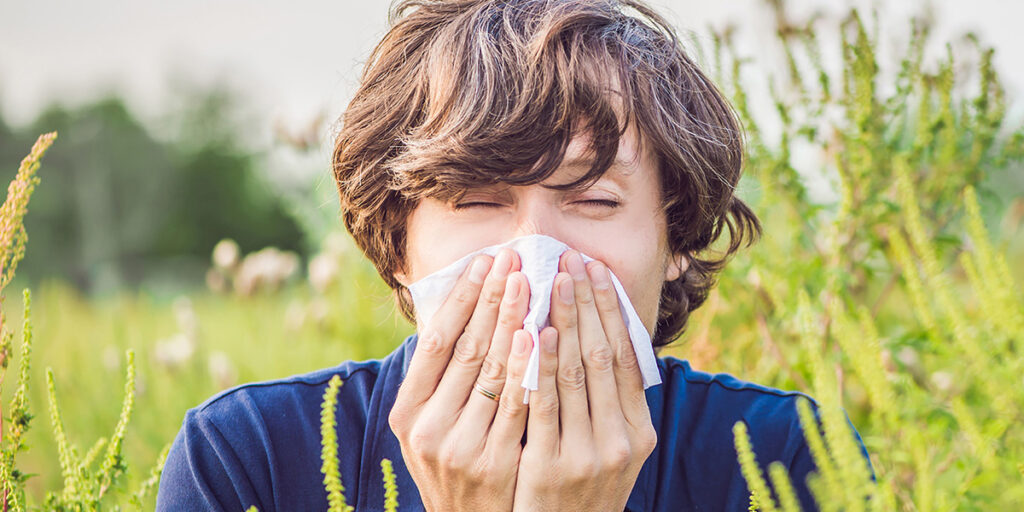

Allergic rhinitis, also called hay fever or pollinosis, literally means “allergic nose inflammation,”
Allergic rhinitis can either be intermittent or persistent. In many people with intermittent allergic rhinitis, an allergen – something that triggers an allergy – sets their symptoms off at about the same time each year. Spring attacks are usually due to tree pollen, while grass pollens dominate in the summer and weed pollens in the autumn. Most people with allergic rhinitis are sensitive to more than one allergen.
Most people with allergic rhinitis know they have it, although it can sometimes be confused with the common cold.
Symptoms include runny nose; sneezing; itchy nose, mouth, throat, or eyes; and congestion. Other symptoms can also occur, such as tearing of the eyes, coughing, sore throat, wheezing, and headache.
People with mild allergic rhinitis have symptoms but they are not troublesome and do not interfere with daily activities such as school, work, or sleep. With moderate/severe allergic rhinitis, the symptoms are troublesome and affect daily life.
Persistent allergic rhinitis is defined as having symptoms more than 4 days a week or for more than 4 weeks a year. This condition is most common in people with allergies to allergens that are present all year. Naturally, people who are allergic to house dust mites or to their own pets tend to suffer year-round. Allergic rhinitis affects about 20% of Canadians.
Ask questions and learn more about your allergies, talk to your Pharmasave pharmacist today!

Pharmasave offers common ailment services across the country, including allergies. Your Pharmasave pharmacist can assess your symptoms and recommend “at-home”, self-care, or over-the-counter treatments. They may also be able to prescribe medication to help treat your allergy symptoms.
The best way to prevent allergic rhinitis is to avoid the allergen, however it is not always possible to control the environment or to eliminate or avoid allergens, especially those that are airborne. Many people need medication treatment for relief. Fortunately, most people respond well to medications. The therapy of choice will depend on your symptoms, the severity of your symptoms, your past response to medications, and other medical conditions that you have, if any.
Find your local Pharmasave and talk to your Pharmasave pharmacist about your allergies and which treatment might be best for you.
Treatment for mild symptoms is usually antihistamines taken either orally (e.g., diphenhydramine*, cetirizine, loratadine, fexofenadine, desloratadine, bilastine, rupatadine), as a nose spray (e.g., azelastine), or as an eye drop (e.g., olopatadine). Your pharmacist or doctor can help you choose the medication best suited to your needs. For example, many oral antihistamines are now “non-drowsy.” People with certain medical conditions (e.g., glaucoma, prostate problems) should consult a medical professional before using certain antihistamines.
It is important to know that some products contain antihistamines plus decongestants for symptom relief. However, nasal decongestant use should be limited to 3 to 5 days, otherwise it may make the symptoms worse. Seeking advice from a health professional is recommended as those with medical conditions such as high blood pressure must use caution with decongestants.
A corticosteroid nose spray (e.g., budesonide, ciclesonide, fluticasone, mometasone) can be tried if antihistamines aren’t working. Corticosteroid sprays can be used if rhinitis symptoms are chronic and are the preferred treatment for symptoms that are moderate to severe. For seasonal allergies, some people may find that nasal sprays, eye drops, and inhalations containing sodium cromoglycate are effective in preventing allergic rhinitis if treatment is started before allergy season and used on a regular basis.
An anticholinergic nose spray (e.g., ipratropium) may also be used to help reduce runny nose symptoms. Another medication called montelukast may be tried when other medications have not worked, or have not been tolerated. Saline nose sprays and lubricant eye drops may also help with nose and eye symptoms.
Women who are pregnant or breast-feeding and children should consult their pharmacist or doctor before beginning treatment for allergic rhinitis.

After an assessment, your Pharmasave pharmacist can write a prescription for treatment instead of an over-the-counter medication or at-home treatment if deemed necessary.
The common ailments, like like allergies, a pharmacist can prescribe for varies by province*. For more details, view the Canadian Pharmacists Association’s chart: Common Ailments Prescribing in Canada.
To learn more about how your pharmacist can help, visit your local Pharmasave store and speak with your Pharmasave pharmacist.
*Note that common ailments prescribing is not always covered by provincial health care – a pharmacy fee may apply. Speak with your pharmacist about eligibility.
Pharmasave uses cookies to provide a personalized experience, analyze traffic, improve site performance, and provide social media features. By using our site, you agree to our privacy policy.